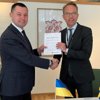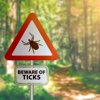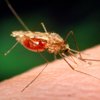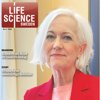Fritextsökning
Artiklar per år
Innehållstyper
-

”Innovationstakten är väldigt hög”
Åsa Ardesjö, Sverigechef på Johnson & Johnson, är Swedish Medtechs nya ordförande. Hon tar över stafettpinnen efter Helena Bragd. Vi ringde upp för att ställa några frågor om hennes nya uppdrag.
-

Studie: Blodprov för att mäta hjärnpåverkan efter neurokirurgi
I framtiden tror forskare vid Göteborgs universitet att ett blodprov skulle kunna vara ett komplement till magnetkamera för att undersöka skador i samband med kirurgi av hjärntumörer.
-

This is the future location of the new national innovation cluster
Mölndal and Goco Health Innovation City will be the site of a new national innovation cluster for advanced therapies. The business community and the Swedish government are splitting the costs of the project, which is expected to produce new treatments
-

Rapid developments in AI – “All stakeholders are struggling to understand it”
Artificial intelligence is being discussed more and more, and developments in the field are moving rapidly. As the Swedish Medical Products Agency testifies, keeping up with developments is not easy.
-

Mästare på mätning: “A och O för life science”
Temperatur, fuktvärde, tryck. Avgörande faktorer i exempelvis ett labb – men många behöver hjälp att mäta rätt. Med en ny kalibreringsmetod blir Nordtec nu marknadsledande i Sverige.
-

Study: Semaglutide tablet produces weight loss
The pharmaceutical semaglutide is effective for weight loss even when given in tablet form, according to a phase 3 study.
-

Studie: Granatäpplen kan hjälpa till att rena vatten från läkemedel
Granatäpplen består inte endast av syrliga kärnor utan är även rik på antioxidanter, som ellagsyra. I en ny studie har forskare använt molekylen för att försöka få bukt med ett växande problem – läkemedelsrester i avloppsvatten.
-

Här hamnar nya nationella innovationsklustret
Mölndal och Goco Health Innovation City blir platsen för ett nytt nationell innovationskluster för avancerade terapier. Näringslivet och staten delar på kostnaderna för projektet, som är tänkt att leda till nya behandlingar mot folksjukdomar som cancer och diabetes.
-

Egetis lägger ned buddiskussionerna
Svenska läkemedelsutvecklaren Egetis Therapeutics har gått ut med att diskussionerna om ett potentiellt förvärv av företaget nu har lagts ner.
-

Norwegian company wins bidding battle for Sensidose
The lengthy battle to acquire medical device company Sensidose is apparently over. Generic medicines company EQL Pharma is pulling out, selling its shares and leaving the way open for Norwegian company Navamedic.
-

Samuel Lagercrantz: The government’s performance in healthcare and life sciences so far
Since the change of government in Sweden, developments in the healthcare sector have shown promising signs, but the outlook in life sciences is less promising, writes Samuel Lagercrantz in an editorial.
-

Thomas von Koch går in som vd för Bactiguard
Det svenska företaget Bactiguards vd Anders Göransson lämnar sin post och går till en annan roll inom företaget som Global Head of Licensing och vice vd. Styrelseordföranden Thomas von Koch går in som tillförordnad vd.
-

Asgard, Aniara och Astra Zeneca: Så valde bolagen sina namn – del 2
Trojaner, litterära klassiker och bisarra konspirationsteorier – här kommer den sista artikeln i vår serie om företagsnamn inom life science.
-

Alligator, Tataa, Ilya: Så valde bolagen sina namn – del 1
Att namnge ett företag kräver strategi, långsiktighet, juridiska kollar – och gärna ett mått av originalitet. Här är fem bolag inom life science med namn som sticker ut, och historierna bakom dem. Inom kort presenterar vi ytterligare fem.
-

Swedish and Ukrainian Medical Product Agencies sign an agreement
The Directors-General of the Swedish and Ukrainian Medical Products Agencies have signed a cooperation agreement.
-

Cyxone får USA-patent för rabeximod
Det svenska bioteknikföretaget Cyxone har erhållit ett patentgodkännande för saltformen av sin substans rabeximod.
-

The first Lyme disease vaccine faces a delay
Pfizer and Valneva’s Lyme disease vaccine, which could be the first of its kind, is facing delays of about a year. The reason is problems at trial sites in the United States, which have forced the companies to drop half of the participants in an ongoing Phase III study.
-

A new malaria vaccine offers hope but much more research is still needed
There has long been no vaccine against malaria, but there have been breakthroughs in recent years. However, it is still unclear how we become immune to the malaria parasite, and this is a vital piece of the puzzle for creating effective vaccines, says malaria researcher Kristina Persson.
-

Study: Chat GPT is more empathetic than doctors
The AI tool Chat GPT is not only more accurate when it comes to answering patient questions – the chatbot is also perceived as almost 10 times more empathetic than real doctors, a new study reveals.
-

Looking for greater Nordic cooperation – “We have Norway and Finland in our sights”
How can Medicon Valley Alliance bring the big pharmaceutical companies back to the organisation? Life Science Sweden discussed this topic and others with the cluster organisation’s new radar pair.
-

Antikroppar tog form med hjälp av artificiell intelligens
Språkmodeller, såsom Chat GPT, som bygger på artificiell intelligens kan användas till en rad olika saker. Nu har forskare, med en språkmodell tillverkad av ett välkänt amerikanskt företag, i en ny studie kunnat designa antikroppar, rapporterar Nature.
-

Nytt nummer – Biotechbolagens fantasifulla namn och intervju med sjukvårdsministern
Nu är ett nytt nummer av Life Science Sweden skickat till tryck. Där läser du bland annat en intervju sjukvårdsministern Acko Ankarberg Johansson. Från och med det nya numret har tidningen både ny form och nytt format.
-

New report: Fewer PhDs in life sciences
A new report from Vinnova suggests that competency returns in the life science sector are declining.
-

Confidence in childhood vaccines is in decline worldwide
Since the pandemic, confidence in vaccinating children has plummeted. In a new report, UNICEF urges world leaders to act before the situation worsens. In 52 out of 55 countries surveyed, public perception of the importance of vaccinating children has